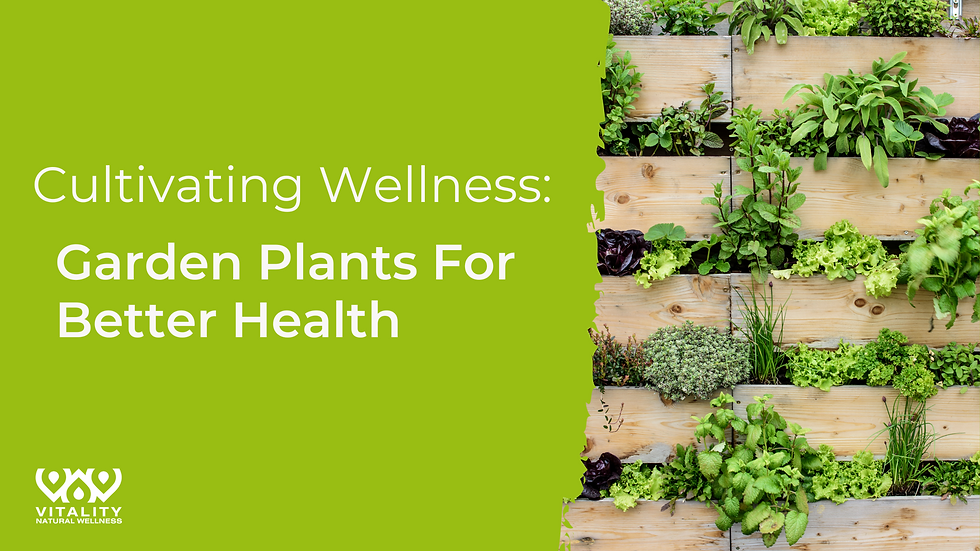Cultivating Wellness: Garden Plants For Better Health
- Jul 11, 2024
- 3 min read
Updated: Dec 24, 2024
Did you know that by growing certain plants in your garden, you can support your wellness journey right from your backyard? Growing your own medicinal plants not only ensures a fresh and organic supply but also provides therapeutic gardening benefits. Here are some great plants to cultivate in your garden for optimal health.
1. Aloe Vera: The Healer
Aloe vera is a powerhouse of health benefits. Known for its soothing properties, this succulent plant is perfect for treating minor burns, cuts, and skin irritations. Its gel contains vitamins A, C, E, and B12, along with minerals like calcium, magnesium, and zinc. Aloe vera juice can also aid digestion, boost the immune system, and help detoxify the body.
Growing Tips: Aloe vera thrives in sunny spots with well-draining soil. Water it sparingly, allowing the soil to dry out between watering. It also grows well in a container and makes a great houseplant so that you can enjoy its benefits year-round!
2. Lavender: The Calming Herb
Lavender is renowned for its calming scent and is often used in aromatherapy to reduce stress and promote relaxation. It also has antiseptic and anti-inflammatory properties, making it useful for treating minor cuts and bug bites. Lavender tea can help with anxiety, insomnia, and digestive issues.
Growing Tips: Plant lavender in full sun with well-draining soil. It prefers a slightly alkaline soil and does well in pots or directly in the ground.
3. Turmeric: The Anti-Inflammatory Wonder
Turmeric is a vibrant yellow spice widely used in traditional medicine for its anti-inflammatory and antioxidant properties. It contains curcumin, which can help with joint pain, digestive issues, and boosting overall immunity. Fresh turmeric root can be used in cooking or brewed into tea.
Growing Tips: Turmeric needs a warm climate and plenty of moisture. Plant it in well-drained, fertile soil and ensure it gets indirect sunlight. It typically takes about 8-10 months to harvest.
4. Peppermint: The Digestive Aid
Peppermint is excellent for supporting digestive health. It can help alleviate symptoms of irritable bowel syndrome (IBS), relieve indigestion, and reduce nausea. Peppermint oil and tea are popular remedies for headaches and respiratory issues due to their menthol content.
Growing Tips: Peppermint prefers partial shade and moist, rich soil. It can be very invasive, so we recommend growing it in a container to control its spread.
5. Echinacea: The Immune Booster
Echinacea (AKA coneflower) is a both a beautiful, pollinator-friendly flower and a popular herb for boosting the immune system. It can help reduce the duration and severity of colds and flu. Echinacea tea or supplements are commonly used to enhance immunity and combat infections.
Growing Tips: Echinacea thrives in full sun and well-drained soil. It is drought-resistant and relatively easy to grow, making it a great addition to any garden.
6. Chamomile: The Relaxing Remedy
Chamomile is well-known for its relaxing and sleep-inducing properties. Chamomile tea is a common remedy for insomnia, anxiety, and digestive issues. It also has anti-inflammatory and antioxidant effects, making it beneficial for skin health.
Growing Tips: Chamomile grows prolifically in full sun and well-draining soil. German chamomile is an annual plant, while Roman chamomile is a perennial. Bring your annual inside each winter and you'll be able to enjoy blossoms every year!
7. Ginger: The Anti-Nausea Root
Ginger is a versatile plant with numerous health benefits, particularly for the digestive system. It can help relieve nausea, reduce muscle pain and soreness, and has anti-inflammatory properties. Fresh ginger root can be used in cooking, teas, and even as a spice in various dishes.
Growing Tips: Like turmeric, ginger needs a warm, humid environment with indirect sunlight. Plant it in well-draining soil and keep it moist but not waterlogged.
8. Produce
We can't close this list out without mentioning the amazing benefits of growing your own fruits and vegetables. Whether you have just enough space for a small salad garden, or room for rows and rows of squash, beans, berries, and more, the superior nutritional benefits from home-grown produce is undeniable. Even if you only have space for container gardening, you can grow your own tomatoes, salad greens, herbs, strawberries, and more! Plus, how fun is it to serve and enjoy a meal that you grew?!
Incorporating these plants into your garden can enhance your health and well-being. Not only do they provide natural remedies for common ailments, but gardening itself offers numerous benefits, such as stress relief and physical activity. Embrace the power of nature and start cultivating a garden that supports your journey to optimal wellness.
If you haven’t joined our Private Facebook Group, please do HERE.
If you’re looking for a more natural way to manage your health, please contact us for a discovery call to see if our approach is right for you.

.png)




Comments